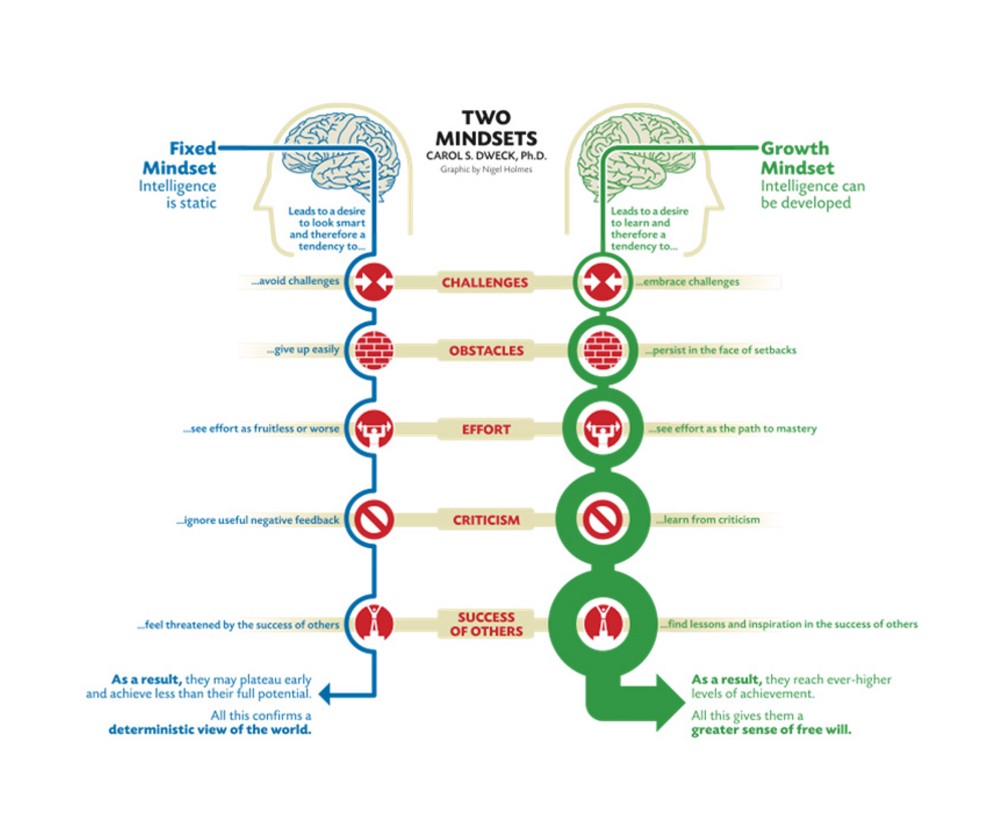Your Mindset Matters, In the Sky and On the Ground
Usually, when someone tells you that there are “two kinds of people in the world,” you’re either in for a bad joke or a cringeworthy platitude. That said, here you have it:

Illustration by Nigel Holmes
So: Are you blue, or are you green?
If you’re a skydiver, there’s a good chance you’re green--and that’s a good thing. (We’ll get into that later.) The above graphic, and the decades-long body of research behind it, derives from the work of Stanford psychologist Carol Dweck, Ph.D. In Mindset: The New Psychology of Success, Carol goes into some depth regarding how the belief in our ability to change over the belief that we just kinda *are* one thing or another conspire to create us. Here’s her TED talk summarizing the work:
https://www.ted.com/talks/carol_dweck_the_power_of_believing_that_you_can_improve#t-106915
While Carol’s TED talk revolves around this mindset dichotomy in the context of childhood development, make no mistake: This is by far not a kid thing. This is an everybody thing.
According to Dweck’s research, a “fixed mindset” insists that our character, our intelligence and our abilities are carved in stone from the start. They’re static. We can’t change them in any meaningful way. If a fixed mindset person enjoys a success, it’s because they are successful and talented. The flipside is that fixed mindset people feel like they must avoid failure, no matter what the cost, because if they fail they are a failure, and that they’ve proven wrong the people who praised them for being smart and being good at things. Every challenge, then, is a gladiatorial trial whereby they’ve gotta prove themselves or wear the cone of shame. When the pressure is on, fixed mindset would much rather lie and cheat than ask for help.
A “growth mindset,” on the other hand, doesn’t look at it that way. A growth mindset sees failure as a heavier weight to lift so it can develop a heretofore weaker muscle. Failure isn’t failure. Failure is simply the state of not having succeeded yet. And, instead of running from challenge (academic, interpersonal, developmental, athletic, and onward), growth mindset runs toward the empty spaces. When growth mindset meets success, it says “Okay, then. What else ya got?”
Growth mindset wants to be better where fixed mindset wants to look better. Ironically, growth mindset has an uncanny knack for scoring on both counts. Growth mindset, as Dweck puts it, “luxuriat[es] in the power of ‘yet.’” Fixed mindset is “gripped in the tyranny of ‘now.’”
There’s more. Disquietingly, whichever mindset looms predominant tends to act as the motor for our entire lives. It drives not only our functional relationship with success and failure, it drives our behavior, our choices, our relationships and, in the endgame, our happiness.
So, now, to the sky.
Look around you for the good news. The lion’s share of skydivers, most of the time, are growth-mindset people. Y’know that graphic that pops up on Carol’s talk at about 07:40? The one that shows electrical activity in the brain when subject students encountered an error? I’m willing to bet that’s every skydiver’s brain on pretty much every jump. As a group, we just love to build out our neural networks, and our culture helps us along that delightfully meandering uphill path.
First off, we see and we honor the work. We watch the hard-charging learning process of the athletes we acknowledge to be good at what they do. We share the workshop where they make their refinements. The exact measurements are up for debate, but we still rattle off jump numbers and tunnel hours and years in the sport when we calculate our expectations. Our licensing system, even, reflects that deference to workmanship and walking the long path over showmanship and cutting corners.
Secondly, our sport has a pretty stark way of showing us the danger of operating out of a clearly deterministic mindset. Generally speaking, jumpers who consider themselves talented tend to behave more recklessly than jumpers who consider themselves lifelong learners. Right?
Finally, our sport’s podiums are consistently graced with teams who bootstrapped themselves into shiny medals. We inherently know that, if we put the time and effort in, we can get there too.
Here’s the cool part: For all that focus on growth, we can still get better. There aren’t “two kinds of people in the world,” after all--and Western culture has doused us in such a steady stream of fixed-mindset malarkey for so long that it’s really hard to get the stains out.
First, we can rinse the idea of “talent” out of our collective hair. “Talent” is a fixed-mindset classic. It describes an ingrained quality, not a hard-won achievement. “Talent” is limiting, and it tends to keep the athletes under its banner from trying anything that might leave its fingerprints on their carefully burnished shine.
Secondly, we can use every available opportunity to praise more wisely in situations where we’re called upon to give feedback. Instead of praising talent (“You’re a natural!”), we can praise process (“I saw you working to control that spin. It was much better this time.”).
Finally, we ourselves can learn to love “not yet.” We can stop laughing off forged logbooks, pay-to-play ratings and the practice of egging ourselves (and other jumpers) on into extralimital skill situations. We can continue the tradition of our forebears in the sport, who carved out enough deep space for growth that we can sink our roots in deep before repotting. The space they created for us is a cherishable gift.
As Dr. Dweck puts it:
“Why waste time proving over and over how great you are, when you could be getting better? Why hide deficiencies instead of overcoming them? Why look for friends or partners who will just shore up your self-esteem instead of ones who will also challenge you to grow? And why seek out the tried and true, instead of experiences that will stretch you?
The passion for stretching yourself and sticking to it, even (or especially) when it’s not going well, is the hallmark of the growth mindset. This is the mindset that allows people to thrive during some of the most challenging times in their lives.“
---------


Join the conversation
You can post now and register later. If you have an account, sign in now to post with your account.
Note: Your post will require moderator approval before it will be visible.